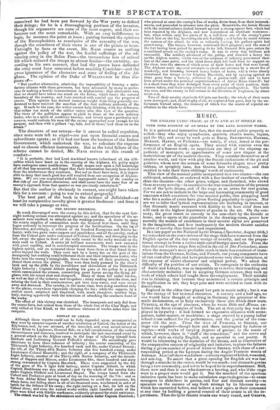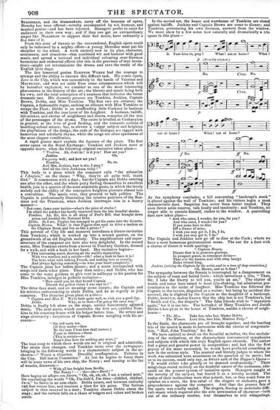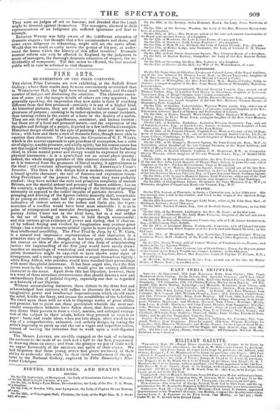M IISI C .
THE ENGLISH LYRIC STAGE, AS IT IS AND AS IT SHOULD BE.
WITH SOME ACCOUNT OF AN OPERA BY THE LATE EGERTON WEBBE.
Fr is a pointed and instructive fact, that the musical public properly so called—they who enjoy symphonies, quartets, church music, fugues,
and the like, and swear by such gods as BACH, BEETHOVEN, HANDEL, MOZART, Ilaynx, or PnaceLb—are rarely, if? ever, found at the per- formance of an English opera. They attend with caution even the revival of a famous work ; so suspicious are they of the claptrap ex- pedients of managers, so apprehensive of some new disgust at the
meretricious air of the modern theatre. They consider themselves as of another world, and view with pity the frantic enthusiasts of the pit and
galleries, whom now the scream of some favourite singer, some pretty tableau, or sprightly tune, has thrown into wild extacy, and thus enabled! to take their three-shillings' worth of excitement.
This view of the musical public as separated into two classes—the one cultivated, scientific, or endowed with a fine instinct of excellence, who shun the theatres—the other gross, vulgar, and theatrical, who crowd them at every novelty—is essential to the true consideration of the present state of the lyric drama, and of the stage as an arena for real genius. For we are not to include in the large and increasing community of good amateurs which constitute the true musical public, that playgoing herd who for a series of years have given fleeting popularity to operas. Nor are we to infer that lyrical representations are declining in interest, or that dramatic music executed with fidelity to its beau ideal does not still rank as the highest department of genius in the art. On the con- trary, the great resort to comedy in the arm-chair by the fireside at home, and to opera at the pianoforte iu the drawing-room, prove how sacredly the models of excellence in their several styles are preserved in the imagination, and how inadequately the modern theatre satisfies desires of novelty thus founded and engendered.
In a late paper on the National Lyric Drama, (Spectator, August 26th,) we remarked on the conventions of the stage that have removed from the English operas of the day every vestige of novelty, and on the prepos- terous attempt to form a native style out of foreign materials. From the time that our forlorn stage first called in the aid of Der Freizscludz, since when the manager's most profitable stock in trade has consisted of trans- lations from the German, Italian, and French, our young composers have all run mad after effect, and have produced some very clever imitations, at the expense of native character and original power. We admit the difficulty of the position of our artists. To retrograde to the orchestra of ARNE and LINLEY, was as impossible as to revive their touching and characteristic melodies : but in adopting German science, they took up tools of which others had taught them the employment. Their mistake was in thinking, that because they understood a certain principle and its application in art, they kept pace and were entitled to rank with its discoverers.
England in the olden time played her part in music nobly ; but it was by the energy of her internal resources. A century and a half ago, no one would have thought of seeking in Germany the grandeur of dra- matic declamation, or in Italy exclusively those airs which draw tears. PURCELL, at the age of nineteen, when he wrote Dido and ,near, ex- hibited the finest examples of both. The art at that early day was dis- played in its purity : it had formed no expensive alliances with scene- painter, ballet-master, or machinist; a stage erected in a young ladies' school-room sufficed for the performance, and the genius of the com- poser did the rest. From the time of PURCELL to SHIELD, our stage was supplied—though here and there interrupted by fashion or caprice—with works of varying degrees of genius ; in the music of which, however, there is "staff o' the conscience," and the nerve and sinew of style so vitally English, and so peculiar to our poetry. It would be interesting in the statistics of the drama, and as illustrative of the comparative success of originality and imitation, to place the failures during a given number of years of ARNE or SHIELD, with those of a cor- responding period at the Lyceum during the Anglo-Teutonic mania of ARNOLD. Alas l all there was failure—a dreary register of killed, wounded, and missing. To assert that a great opening for English art was lost through a mistake in the outset, would be too much ; real dramatic genius being a rare commodity, and not to be hoped for in superabundance. Stil}, there now and then is one who deserves a hearing, and who if the stage were in a proper state would get it. But the mischief of the spurious imitative opera has been to make calculation supersede genius—to cause managers to disbelieve in genius, and fear and distrust novelty—to speculate on the success of any fresh attempt by its likeness to one which has succeeded before, and believe a new opera at their command at any time by holding a general council of their artists in all the de- partments. Thus the lyric theatre treads one weary round, and Galina,
STAnwreus and the dressmakers, carry off the honours of opera. Novelty has been offered—novelty accompanied by wit, humour, and musical genius—and has been rejected. Managers prefer to cater for audiences in their own way ; and if they can get an extraordinary singer like MALIBBAN to support their bad music, have ordinarily a fine time of it.
From this state of slavery to the conventional, English opera could only be redeemed by a mighty effort—a young Hercules must put his shoulder to the wheel. A work entirely new in its plan, character, sentiments, and situations—that combined wit and humour with good music, and spread a national and individual colouring over German harmonies and orchestral effects (for this is the province of true inven- tion)—might yet revolutionize the drama and save the credit of the English lyric stage.
The late lamented genius Rammed; WEBBE had the courage to attempt and the ability to execute this difficult task. His comic opera, Lore in the City, which was successively in the hands of VESTRIS and MACREADY, and was set aside from some circumstances which will be hereafter explained, we consider as one of the most interesting pbsenomena in the history of the art ; the libretto and music being both his own, and the total conception of a neatness that indicates the rarest dramatic tact. His dramatis personce are Tomkins, Jenkins, Captain Brown, Dobbs, and Miss Tomkins. The first two are citizens; the Captain, a fashionable rogue, seeking an alliance with Miss Tomkins to escape the Fleet ; Dobbs is an nnoffending little Cockney in business with Tomkins, and the true lover of his daughter. A footman, bailiffs, bill-sticker, and chorus of neighbours and diners, comprise all the rest of the personages of the drama. The satire is levelled at Cockneyism in general, at the love of good feeding, and the romantic notions of boarding-school misses ; but, to elevate a vulgar subject and heighten the playfulness of the design, the ends of the dialogue are tagged with humorous and scholarly rhyme, while the songs are often specimens of the most elegant versification.
A rapid glance must explain the business of the piece. The first scene opens on the Royal Exchange : Tomkins and Jenkins meet at opposite doors; when the following original recitative takes place- " Tomkins. Ah, Jenkins! is it yen? How are you? Jenkins. Oh, I'm pretty well; and how are you ? Tomkins. So, so, And Mrs. Jenkins, how is she, I pray ? And all the little Jenkinses, today ? pray y?
leads to a piece which the composer calls " the salutation
a r Anglais," on the theme " Why, they're all quite well, thank God." It commences with a duet ; but the Captain and Dobbs entering one after the other, and the whole party finding themselves in excellent health, join in a quartet of the most admirable gusto, in which the lovely melody and the oddity of the conception heighten pleasure almost into a convulsion. The music over, they proceed to 'talk politics. The_ Captain is professionally illustrating the relative positions of the Rue- siaus and the Prussians, when Jenkins interrupts him in a hearty manner- " But come, damn your tactics—what's the price of stocks ? I'm afraid the market has hardly recovered from the late dreadful shocks. Tomkins. Ab, Sir, this is all along of Peel's Bill, that brought down prices and doubled the National Debt. Dobbs. So I see, Figgina has managed to get his name into the Gazette. Captain Brown. What! is that Figgios that used to drive a tandem on the Clapham Road, and live so like a prince ? "
This portrait of City life and manners introduces a dinner-invitation from Tomkins ; which is worked up into a second quartet, on the groundwork of an old English melody. The amplifications and super- structure of the composer are here also very delightful. In the second scene, Miss Tomkins enters from a bower in Finsbury Gardens, dressed for a walk, and with a book in her hand. Her recitative begins-
" This interesting novel, showing all the world's depravities, With two murders and a suicide—Oh ! what a book to have it is ! The hero, what with talking French, and making love so sweetly, And always fighting somebody—he wins your heart completely."
The Captain joins her before dinner ; and a scene interspersed with songs and duets takes place. They then retire • and Dobbs, who has come to the same gardens to give vent in soliloquy to his passion for Miss Tomkins, indulges in pathetic recitative- " Flow could you let that horrid Captain Disturb the golden vision I was rapt in ? " The three then meet, and an amusing scene occurs ; the Captain and his mistress endeavouring to elude Dobbs, and he as eagerly to join company. The situation gives place to a trio-
` Captain and Miss T. We're both quite well, so wish you a good day. Dobbs. Why, as to that—I'm going the same way." Dobbs is finally left alone on the stage, amidst humorously agitated music. The next scene, which concludes the first act, exhibits Tom- king in his counting-house with his ledger before him. He writes and sings alternately ; suspicions of Captain Brown mingling with his ac- counts—
Six and carry ten.
(If they marry—then
He the sum 1 lent him shall restore.)
Fours in thirteen—three.
(This is certain—he Shan't dine here for nothing any more.)" The bass song to which these words are set is original and admirable.
The strain then changes, and Tomkins turns over the newspaper; bringing in the following words to a characteristic subject in the or- chestra—" Wants a situation. Dreadful conflagration. Failures in the City. Bill lost in Committee." At last he begins to fancy there will be some news of his own ship, the Nancy ; and turning to the list of wrecks, discovers-
" With all her freight from Seville, The Nancy ! - - - the—the—Devil !"
Here begins an allegro con furore, " Oh, oh, oh, oh, I am a ruined man." On concluding the words "Oh, I'm dish'd, I'm done—diddled, diddled, done," he faints in an arm-chair. Dobbs enters, and between curiosity and fear rouses him, and receives a blow for his pains. The furious subject is then renewed in a duet ; Tomkins chaces Dobbs about the stage ; and the curtain falls on a chaos of ledgers and rulers and broken stools. III the second act, the house and warehouse of Tomkins are closed against bailiffs. Jenkins and Captain Brown are come to dinner; and Tomkins, personating his own footman, answers from the window. We must show by a few notes how naturally and dramatically a trio opens in this place-
As the symphony concludes, a bill concerning "bankrupt's stock" is placed against the wall of Tomkins; and his visiters begin a most characteristic duet. Suspicion has never been better treated. They soon throw aside reserve, talk loudly and insolently; and Tomkins, no longer able to contain himself; rashes to the window. A quarrelling duet now takes place- " And who cares, I wonder, for you, for you? And who cares, I wonder for you? If you come here to dine Off a dinner of mine,
I wish you may get it, I do, I do, I wish you may get it, I do."
The Captain and Jenkins now go off to dine at the Cock; where we have a most humorous gastronomical scene. The cue for a duet with a chorus of diners is worth quoting-
" Captain Brown.
Dinner that is in presence glorious, In prospect grand, in retrospect divine— That o'er the human soul with sway benign Rules virtual king.
Jenkins (seizing the Captain by the wrist, and in a tone of deep conviction,) Oh, Brown, and so it does!"
The sympathy between the friends is interrupted by a disagreement on the subject of roast and boiled fowls : which introduces a trio, " Then, Sir, I take the liberty to tell you, you're an ass." The clatter of words and notes here raised is most side-shaking, but admiration pre- dominates in the midst of laughter. Miss Tomkins has followed the Captain to the tavern, disguised as a waiter ; but being by accident dis- covered, she is slighted by the Captain as the daughter of a bankrupt. Dobbs, however, makes known that the ship lost is not Tomkins's, but " Smith and Co., the draper's." The false friends wish to " ingratiate again," but it is too late. The betrothal of Mary Tomkins and Josiah Dobbs takes place in the house of Tomkins, amidst a chorus of neigh- bours— " The Men. Take her, take her, Master Dobbs.
The Women. Love him, love him, Mistress Polly."
In the finale, the characters are all brought together, and the bustling trio of the tavern is made to harmonize with the chorus of congratula- tion, " Hail, John Tomkins," &c. &c.
We have omitted to dwell on the beautiful melodies, the fine modula- tion of the recitatives, or the characteristic instrumental symphonies and subjects with which this truly English opera abounds. The author had a great and general power in composition ; and had this the first gayety of his muse succeeded, be would have produced something as new in the serious style. The musical and literary judges to whom the work was submitted were unanimous on the question of its merit; but as to its success, could only say, as Swxi'r said of the Beggar's Opera- " It would either take greatly or be damned confoundedly." Their misgivings rested entirely on the doubtful nature of the audiences, edu- cated on the present s'stem of imitative opera. Managers caught at the novelty of the subject, but feared it as a novelty untried. The scales of their inclinations were thus poised; but, as they could form no opinion on a score, the first cabal of the singers or orchestra gave a preponderance against the composer. And thus the present fate of the opera was cruelly sealed. The singers, fearing to undertake diffi- cult music which required also the able personation of character—both out of the ordinary routine, lent themselves to evil whisperings.
They were no judges of wit or humour, and dreaded that the laugh might be directed against themselves. The managers, alarmed at their representations of an indignant pit, suffered ignorance and fear to triumph. EGERTON WEBBE was fully aware of the indifferent education of dramatic singers; but thought that a few omissionshere and there, and some extra diligence in rehearsing, might still set the opera afloat. Would that we could as easily revive the genius of his pen, as under- stand the lesson tibia the history of this affair involves! Dramatic musical reform can only be effected in England by the judgment in music of managers, the thorough dramatic education of singers, the in- dividuality of composers. Till this union be effected, the real musical public will in vain be solicited to visit theatres.




























 Previous page
Previous page